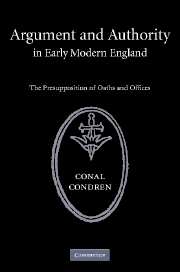Book contents
- Frontmatter
- Contents
- Preface
- Introduction
- Part I The liquid empire of office
- 1 An overview
- 2 Ceremonies of office: The kiss of the tutti-man
- 3 Institutionalised office: a sense of the scavenger
- 4 The vocabulary of office
- 5 Offices of the intellect: player, poet and philosopher
- 6 Soul and conscience
- Part II The authority and insolence of office
- Part III ‘I, A. B.’
- Epilogue
- Bibliography
- Index
1 - An overview
from Part I - The liquid empire of office
Published online by Cambridge University Press: 28 October 2009
- Frontmatter
- Contents
- Preface
- Introduction
- Part I The liquid empire of office
- 1 An overview
- 2 Ceremonies of office: The kiss of the tutti-man
- 3 Institutionalised office: a sense of the scavenger
- 4 The vocabulary of office
- 5 Offices of the intellect: player, poet and philosopher
- 6 Soul and conscience
- Part II The authority and insolence of office
- Part III ‘I, A. B.’
- Epilogue
- Bibliography
- Index
Summary
Yes Socrates.
(Thrasymachus (eventually), Plato, Republic)Enter Thrasymachus, blustering and abusive. Socrates had been asking for a general definition of justice and for a good while the sophist had been trying to obtrude himself into the discussion, palpably irritated with the display of Socratic trickery at the expense of the flaccid Polemarchus. Bursting free of his restraining companions, and naming his price, he defined justice as the interest of the stronger. Then, having failed to defend his definition, he appealed to the facts of life. As shepherds exploit their sheep, the strong exploit the weak. The ruler is close to being a wolf in shepherd's clothing and rapacity (pleonexia) is justice or superior to it. Thrasymachus' entry anticipated his argument. Socrates inverted the force of the analogy. Shepherds, as shepherds, must attend to the interests of their flocks. The shepherd's art, like any other, is concerned with nothing other than the well-being of its subject. Therefore, the art of ruling considers the interests of the ruled. Pleonexia is injustice. In the Homeric and Pindaric senses of the term, the way (dike) of the wolf is anything but human excellence.
This may seem an unlikely place to begin a study of the notion of office-holding in seventeenth-century England. Historically speaking, we associate the notion of office with Cicero, whose De officiis became a much translated and cited grammar school text-book.
- Type
- Chapter
- Information
- Argument and Authority in Early Modern EnglandThe Presupposition of Oaths and Offices, pp. 15 - 35Publisher: Cambridge University PressPrint publication year: 2006

